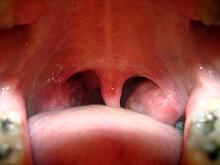GOTHENBURG, SWEDEN - Tonsillectomy has beneficial clinical and immunologic effects on chronic plaque psoriasis in patients who get exacerbations associated with streptococcal throat infections, according to a small, prospective, randomized trial.
The proposed mechanism of benefit from the surgery is that it removes an important source of circulating pathogenic T-cells generated in the palatine tonsils. The T-cells respond to antigenic short peptides common to streptococcal M-protein and skin keratins, Dr. Ragna Hlin Thorleifsdottir explained at the annual congress of the European Academy of Dermatology and Venereology.
"Streptococcal M-protein contains a number of amino acid sequences also found in keratins that are upregulated in psoriatic lesions. It’s possible that T-cells that recognize such M-protein sequences in the tonsils also recognize corresponding sequences in the skin. We have identified such cross-reactive T-cells in the blood of psoriasis patients," said Dr. Thorleifsdottir of Landspitali University Hospital, Reykjavik, Iceland.
She reported on 29 patients with chronic plaque psoriasis and a history of exacerbations linked to strep throat randomized to tonsillectomy or a nonsurgical control group. Participants were followed prospectively for 2 years by blinded observers who assessed them every 6 months by Psoriasis Area and Severity Index (PASI) scores and quality of life instruments. Patients remained on their pre-enrollment psoriasis therapies.
Thirteen of 15 tonsillectomy patients showed significant improvement, with reductions of 30%-90% in PASI scores during 2 years of follow-up. The reduction in PASI scores peaked a mean of 18 months post-surgery, at which point 9 of 15 patients (60%) reached PASI 50 (50% improvement), compared with baseline. At 24 months, the tonsillectomy group still had a mean 32% reduction in PASI scores. In contrast, PASI scores did not change significantly over time in the control group.
The improvement in PASI scores in the tonsillectomy group was strongly correlated with a reduction in circulating, cross-reactive, skin-homing CLA+ CD8+ T-cells responsive to 16 homologous M-protein and skin keratin peptides. Skin-homing CLA+ CD4+ T-cells also declined with decreasing PASI scores in the tonsillectomy patients, although this association, while significant, was not as strong as for CD8+ T-cells.
Other investigators have anecdotally reported in uncontrolled series that tonsillectomy appears to have a beneficial effect on psoriasis, said Dr. Thorleifsdottir. What distinguishes the Iceland study is that it was randomized, prospective, and blinded, and it evaluated a specific proposed mechanism involving cross-reactive T-cells. Whether the observed clinical improvement will be maintained beyond 2 years remains to be seen.
Dr. Thorleifsdottir said she had no financial conflicts regarding the tonsillectomy study, which was funded by the University of Iceland Research Fund.


